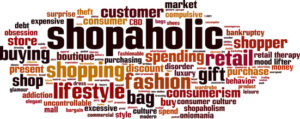Contents
- 1 What Is Compulsive Shopping?
- 2 Symptoms Of Compulsive Shopping
- 3 Causes Of Compulsive Shopping
- 4 How It’s Different From Regular Shopping?
- 5 Consequences Of Compulsive Shopping
- 6 Who Is Most at Risk?
- 7 What Can You Do About It?
- 8 Treatment For Compulsive Shopping Disorder
- 9 Tips To Help Someone With Compulsive Shopping
- 10 Conclusion
What Is Compulsive Shopping?

Compulsive shopping, also known as oniomania, is a disorder characterized by an uncontrollable urge to shop, even when the individual knows that they don’t have the money to afford it and will likely end up in debt. Compulsive shoppers may find relief or pleasure from buying things, but often feel guilty or ashamed about their behavior.
The causes of compulsive shopping are not fully understood, but it is believed to be related to a combination of psychological and environmental factors. Some people may be more at risk for developing the disorder due to their personality type or because they grew up in a household where shopping was seen as a way to cope with stress or emotions.
Symptoms Of Compulsive Shopping

Some common signs of compulsive shopping are lack of control over shopping behavior, frequently making excessive purchases, spending way above one’s budget, using shopping as a source of relief or stimulation, and significant debt.
Many people who develop compulsive shopping disorder are middle-aged women. However, men and children can also develop the disorder.
If you or a loved one exhibits any of the following signs, especially if they are taking up all your time and money, you may want to seek treatment for compulsive shopping disorder:
- Spending way above budget
- Feeling an urgency to buy something immediately, even if it’s not needed or can’t afford it
- Spending most of the day shopping, especially online
- Getting irritable when forced to stay away from shopping
- Hiding purchases by stashing things in different places around the house
- Going through depression or anxiety when forced to stay away from shopping for a period of time
- Spending more time than intended shopping
- Shopping as a way to relieve negative emotions like stress or anxiety
- Shopping to distract themselves from problems in their life
- Having unrealistic ideas about what they can afford
Causes Of Compulsive Shopping

The causes of compulsive shopping are not fully understood, but it is believed to be related to a combination of psychological and environmental factors. Some people may be more at risk for developing the disorder due to their personality type or because they grew up in a household where shopping was seen as a way to cope with stress or emotions.
The psychological factors that may contribute to compulsive shopping include low self-esteem, poor body image, anxiety, depression, and loneliness. Environmental factors that can contribute to the development of the disorder include easy access to credit and stores, marketing that promotes over-consumption, and stressful life events.
How It’s Different From Regular Shopping?
Compulsive shopping is different from regular shopping in that the individual feels like they need to shop or it becomes an uncontrollable urge. They find relief or pleasure from purchasing things, but usually, feel guilty about their behavior afterward. This can lead to feelings of depression and anxiety which causes them to go back out and shop again.
Consequences Of Compulsive Shopping
Compulsive shopping can have a serious impact on both your emotional and financial life, as well as that of the people around you.
It may cause problems in relationships with friends or loved ones who don’t approve of the way you’re spending money, or people who are concerned about you spending more than you can afford. Financial problems caused by compulsive shopping can make it difficult to pay bills or even stay afloat financially and may lead to individuals needing to file for bankruptcy.
Physical And Psychological Effects

The consequences of compulsive shopping, both financial and emotional, can lead to significant problems in an individual’s life. The more time and money spent on shopping the less there is for other things such as eating or paying bills so the individual may find themselves having trouble affording food or paying the bills. They may also find themselves in a lot of debt from their shopping habits, which can significantly impact their credit score and make it difficult for them to get approved for more credit cards.
In some cases, compulsive shopping has been related to gambling addiction. In these instances, individuals have lost significant amounts of money because of their addiction, and many of them have legal issues due to their debt.
Who Is Most at Risk?
Anyone can develop a compulsive shopping disorder, but there are some individuals who may be more at risk than others. This can include those who have a history of depression or another mental health condition, as well as those with excessive amounts of stress in their life.
People who grew up around someone who had problems with compulsive shopping may also find themselves developing the disorder.
What Can You Do About It?
If you think you might have a problem with compulsive shopping, speak up and ask for help! Many people wait for compulsive shopping disorder to get so bad that they can’t afford to buy anything or even pay the rent before reaching out. But there are many resources out there, including helplines and support groups, which can help you act on your desire to seek treatment.
Treatment For Compulsive Shopping Disorder

If you think you might have a problem with compulsive shopping, there are many resources available to help you seek treatment. This includes helplines and support groups where you can talk to others who are going through the same thing. There are also treatments available that can help you manage your disorder and learn how to deal with the urges to shop. Finding the right treatment is important and may involve some trial and error, but oftentimes you will find that there are many resources available that can help. It is also recommended to speak with your doctor as they can help guide you in the right direction depending on your situation.
Therapy For Compulsive Shopping
Therapy for compulsive shopping disorder can involve a variety of different treatments. Some common therapies include Cognitive Behavioral Therapy (CBT), Dialectical Behavioral Therapy (DBT), and mindfulness-based therapies.
Cognitive Behavioral Therapy is a therapy that focuses on how your thoughts, feelings, and behaviors are all related to each other. In CBT, you will learn how to identify and change any thoughts that might be contributing to your compulsive shopping.
Dialectical Behavioral Therapy is a type of therapy that focuses on accepting yourself and your feelings, while also working to change the behaviors that are causing problems in your life. This therapy can be helpful for individuals who have trouble regulating their emotions.
Mindfulness-based therapies are therapies that focus on being present in your life. With this therapy, you will work to notice your thoughts and feelings without judging them as “bad” or “good.” Mindfulness also focuses on being aware of the world around you, which can be helpful for those who have difficulties focusing because they are always thinking about shopping.
Tips To Help Someone With Compulsive Shopping

Having your friends and family there to support you is an integral part of recovery.
If you know someone who is dealing with compulsive shopping, there are ways that you can help them.
- One thing that you can do is encourage them to seek treatment. This may involve talking to a doctor or therapist, seeing a support group. Or using one of the many resources available for compulsive shopping disorder.
- You can also help them by keeping an eye on their spending. If they are constantly overspending or buying things they cannot afford. Let them know and offer to help them keep track of their spending.
- Finally, be supportive and understanding. Compulsive shopping can be a difficult disorder to deal with. And your loved ones will appreciate knowing that you are there for them.
If you or someone you know might have a problem with compulsive shopping. There are many ways to seek treatment and support. If you’re not sure where to start, consider trying one of the many helplines available to assist you in your search.
Conclusion
It is important to note that compulsive shopping does not always manifest as a result of consuming too much media. There are many causes for this mental illness, including genetic predisposition and social factors. It can be difficult to break the habit because it becomes an addiction in its own right; one that people who struggle with it become desperate to feed. If you or someone you know exhibits signs of compulsive shopping habits, please contact our team and doctors. So they can determine what treatment options would work best for them.
If you are looking for affordable Online Counseling MantraCare can help: Book a trial therapy session


